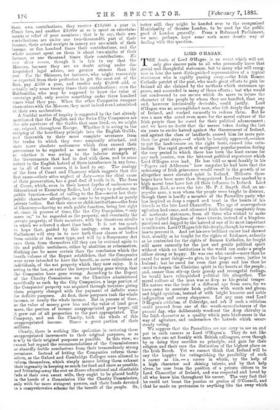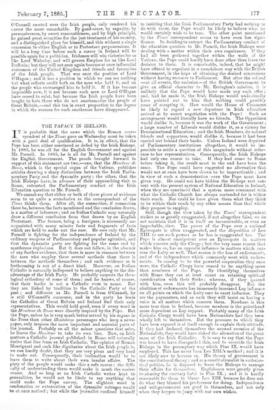LORD O'HAGAN. LORD O'HAGAN.
THE death of Lord O'Hagan is an event which will not only give sincere pain to all who personally knew that genial and thoughtful statesman, but to many who will recognise in him the most distinguished representative of a typical statesman who is rapidly passing away,—the Irish Roman Catholic patriot of the past, who made great efforts to gain for Ireland all she claimed by the methods which statesmen approve, and succeeded in many of those efforts ; but who would not condescend to use means which do more to injure the character of the people by whom they are handled, than any
end, however intrinsically desirable, could justify. Lord (Mogan was an accomplished man, who felt deeply the wrongs of Ireland, and worked earnestly to redress them. But he was a man who cared even more for the moral culture of the Irish people than he cared for their political advancement ; and we have no doubt that the means taken during the last six years to excite hatred against the Government of Ireland, and against the class of landlords, caused him far more pain than the great steps,—of which he heartily approved,—taken to put the land-tenure on the right basis, caused him satisfaction. The rapid growth of malignant popular passion during the very period in which there has been the least excuse for any such passion, was the bitterest political experience which Lord O'Hagan ever had. He has told ua most frankly in his " Papers and Addresses" how sanguine he had been that the redressing of Irish grievances would result in the growth of an altogether more elevated spirit in Ireland. Hitherto these hopes have been more than disappointed. Leaders marked by a high moral tone have lost all their influence in Ireland. Lord O'Hagan died, as even the late Mr. P. J. Smyth died, an unpopular man, a man whom the people were taught to distrust, though there is hardly a member of the Parnellite party who has inspired so deep a regard and trust in the hearts of his friends as the late Lord Chancellor. The age of unscrupulous agitation had come, and alienated Irish feeling completely from all moderate statesmen, from all those who wished to make a true United Kingdom of these islands, instead of a kingdom paralysed and dogged by the hatred of one of its most important constituents. Lord O'Hagan felt this deeply, though he was powerless to prevent it. And yet his own brilliant career had showed that, steadily as he fought for the rights of Irishmen, ardently as he contended for the rights of Roman Catholics, he fought still more earnestly for the just and gentle political spirit without which no institutions in the world can make a people either strong or happy. He was one who cared—more than he cared for most things—to give, in the largest sense, justice to Ireland ; but he cared for even that great end less than he cared to deepen the Christian spirit in the hearts of the people ; and, sooner than stir-up their greedy and revengeful feelings, he would have relinquished political life altogether. The moral culture of the man was as deep as his genial temper. His nature was the fruit of a different age from ours, for we have come to associate Irish politics with wrath and gloom and frigid cynicism, instead of with bright humour and noble indignation and sunny eloquence. Let any man read Lord O'Hagan's criticism of Coleridge, and ask if such a criticism could proceed from one of the wrath-manufacturers of the present day, who deliberately weed-out the deep chivalry in the Irish character as a quality which puts hindrances in the way of agitators, and undermines the hatreds which secure steady voting.
We suppose that the Parnellites are not sorry to see an end put to such careers as Lord O'Hagan's. They do not like men who can act frankly with British colleagues, even though by so doing they sacrifice no principle, and gain for their religion and their race the distinction of the highest place on the Irish Bench. Yet we cannot think that Ireland will be any the happier for extinguishing the possibility of such a career as his, — a career in which, by the help of a high character and shining talents, and by that help alone, he rose from the position of a private citizen to be Lord Chancellor of Ireland, and was respected and loved by all who knew him throughout his career. The very fact that he could not boast the passion or genius of O'Connell, and that he made no pretension to anything like the sway which career the more remarkable. By good-sense, by sagacity. by peisuasiveness, by sweet reasonableness, and by high principle, he gained great securities for the just treatment of his country. and a distinguished place for himself, and this without a single concession to either English or to Protestant prepossessions. It will be a long time before such a career in Ireland will be possible again for a politician. Irishmen will win victories for us like Lord Wolseley, and will govern Empires for us like Lord Dufferin ; but they will not soon again become at once influential statesmen of the United Kingdom and friends and favourites of the Irish people. That was once the position of Lord O'Hagan ; and it was a position in which we can see nothing but what reflects credit both on the man who held it, and on the people who encouraged him to hold it. If it has become impossible now, it is not because such men as Lord O'Hagan have ceased to exist, but because the Irish people have been taught to hate those who do not anathematise the people of Great Britain,—and this too in exact proportion to the degree in which the reasons for such anathemas have disappeared.



































 Previous page
Previous page